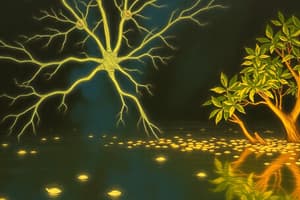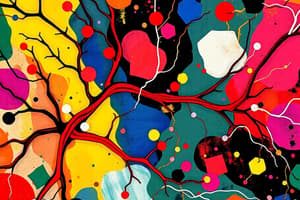Podcast
Questions and Answers
Which neurotransmitter is responsible for parasympathetic and cholinergic nerve actions?
Which neurotransmitter is responsible for parasympathetic and cholinergic nerve actions?
- Acetylcholine (correct)
- Dopamine
- Histamine
- Serotonin
Which drug is used to stimulate gut motility in cases of ileus?
Which drug is used to stimulate gut motility in cases of ileus?
- Carbachol (correct)
- Bethanechol chloride
- Pilocarpine
- Physostigmine
Which compound has the capacity to bind covalently to acetylcholinesterase, causing generalized cholinergic stimulation and paralysis of motor function?
Which compound has the capacity to bind covalently to acetylcholinesterase, causing generalized cholinergic stimulation and paralysis of motor function?
- Bethanechol chloride
- Pralidoxime (PAM)
- Isoflurophate (correct)
- Physostigmine
Which drug is used to treat glaucoma by increasing the secretion of exocrine glands and decreasing intraocular pressure?
Which drug is used to treat glaucoma by increasing the secretion of exocrine glands and decreasing intraocular pressure?
Flashcards are hidden until you start studying
Study Notes
Neurotransmitters and Cholinergic Functions
- Acetylcholine (ACh) is the neurotransmitter responsible for parasympathetic and cholinergic nerve actions.
- It plays a role in regulating various bodily functions, including gut motility, heart rate, and muscle contraction.
Pharmaceuticals and Therapeutic Applications
- Bethanechol is used to stimulate gut motility in cases of ileus, a condition characterized by bowel obstruction.
- Organophosphates have the capacity to bind covalently to acetylcholinesterase, causing generalized cholinergic stimulation and paralysis of motor function.
- Pilocarpine is used to treat glaucoma by increasing the secretion of exocrine glands and decreasing intraocular pressure.
Studying That Suits You
Use AI to generate personalized quizzes and flashcards to suit your learning preferences.





